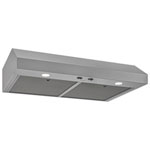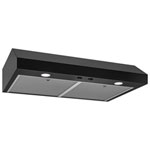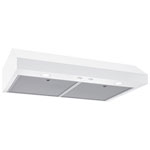Range Hoods
Our Holiday Price Guarantees
Shop deals early knowing that the price of any product with a "Boxing Day Price Now" or "Lowest Price of Dec." badge won't go any lower. If it does, we'll refund the difference. Guaranteed.
Airing Out the Benefits of Range Hoods
One of the true pleasures of cooking is the aromas created when ingredients, spices and oils combine to tantalize the senses and entice the appetite. But when the meal is over, those odours in the air can become unwelcome kitchen guests. Range hoods are essential to removing those smells while airing out your cooking area and keeping it smelling fresh.
Range hoods come in various formats and sizes to accommodate your kitchen's layout and ventilation options, so let's have a look at how this cooking staple can work for you.
Under the Hood
The majority of range hoods come in the standard format of a hovering canopy above your stove cooktop. It features a light to illuminate your cooking, as well as a fan to ventilate the aromas and smoke that arise from frying, boiling and baking. These hoods can either be incorporated into a cabinet above, usually called an undercabinet hood, or come as a wall-chimney hood, which is a more stylish version that doesn't need an overhanging cabinet. If your kitchen features an island cooktop, then an island hood hung from the ceiling is your ideal option, though they tend be higher on the price spectrum.
Duct for Cover
The hood's central function is to remove irritants in the air, like grease and smoke. How a range hood accomplishes this is through an exhaust system either ducted to the outside of your home, or re-circulated through a filtration device. If you have the option of hooking your hood to an exterior wall, this is considered the most effective way to cleanse the air, but it usually requires the most intensive installation process. You can also have a combo ventilation unit, referred to as a convertible, which gives you the option to both duct air and re-circulate it.
Finding the Right Filter
To trap grease and other small molecules from the air before re-circulating it through your kitchen, a non-ducted range hood uses charcoal filters that intermittently need replacement. Ducted hoods, however, rely on aluminum filters to trap grease before smoke and odours are sent outside. These aluminum filters are washable and usually dishwasher-safe. Many hoods have indicator lights to let you know when it times to replace or wash these filters.
Sound of Sones
While range hood fans perform the essential function of re-directing air and smoke in the kitchen, this can be a loud and distracting source of white noise. Exhausting air flow sound is measured in CFMs (cubic feet per minute) and sones, and the higher the CFM/sone rating, the louder the range hood. For some idea of scale, one sone is equal to the soft hum of refrigerator in a noiseless kitchen.






